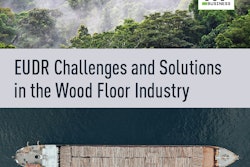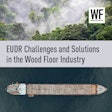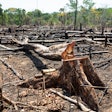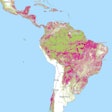The Malaysian Minister of Plantation Industries & Commodities, Mr. Bernard Dompok, was kind enough to have a frank discussion with me regarding the Malaysian view on international legality movements. Here's the rest of our interview. (You can also read Part 2.)
Q: What is the Malaysian reaction to the Lacey Act, the European FLEGT (Forest Law Enforcement Governance and Trade) and the other regulations that are being developed to ensure legal timber trade internationally?A: We are as concerned as everyone is about the environment, perhaps moreso. The forests of Malaysia are part of our history and they must be part of our future. We take great pride that we have over a 100 years of experience in sustainably managing our natural forest. Today Malaysia still has more than 56% of its land area under natural forest cover, and still more of our country is greened by plantations.
The world is rightly concerned about illegal logging and trade in illegal timber, as well as our social and environmental responsibilities. We believe a balance must be struck between regulations that help eliminate poor behavior without overburdening or restricting companies and industries that are already practicing good behavior.
Pressure asserted by "green activists" has put the governments in consumer countries under pressure to introduce public policies to give emphasis on procuring legal, if not sustainable, timber. In the U.S., this is manifested by the amended Lacey Act, while in Europe, the EU will begin enforcing its timber regulation from March 2013.
As a major timber producing and exporting nation, Malaysia supports such initiatives so long as their implementation are pragmatic. We are concerned that if regulations become too burdensome, some companies, innocent of wrongdoing, may still cease production. This could cause a shift in demand to alternative materials rather than timber. It is also very important that these regulations do not discriminate between temperate or tropical sources.
Q: Are you concerned about discrimination?
A: The regulations are being developed differently in each country, so we'd have to consider this on a case-by-case basis. But generally, we are of the view that any new legislations or measures introduced must be carefully developed so they are not too cumbersome or impractical and do not adversely impede international trade in timber products. We would like to see regulations that encourage good behavior rather than becoming simply "non-tariff barriers" to the legitimate trade of timber products. As wood professionals know, healthy forest industries mean healthy forests. We do not want to see a reduction in legal and responsible use of the forests lead to a reduction in forests themselves.
Q: What steps have you taken to position Malaysia on the new "legal" stage?
A: Malaysia has always taken the issue of illegal logging and trade in illegal timber very seriously. Our National Forestry Act imposes heavy penalties on illegal logging and empowers local police and armed forces to carry out surveillance of forestry activities to help curb illegal logging and the encroachment of forest areas.
We are currently negotiating with the European Union to conclude the Voluntary Partnership Agreement (VPA) under its Forest Law Enforcement Governance and Trade (FLEGT) initiative. This would be the first step in establishing a "green pass" for Malaysian wood products in the EU.
Also, as we've discussed, we are increasing the volume of plantation timber available to the industry. Plantation forests, being largely owned by large private companies, have good security in place and there is almost no record of the illegal harvesting of plantation material.
Finally, Malaysia currently has the largest area of certified tropical forest in the world, with 4.95 million hectares certified under the Malaysian Timber Certification Scheme (MTCS), which is endorsed by the PEFC (Programme for Endorsement of Forest Certification). We also have FSC-certified forests and plan to continue to increase our certified forest coverage in the years to come.
Malaysia is determined to be a long-term supplier of legal and sustainable timber products, both in native tropical timbers and in plantation species, to the entire world for generations to come.
































